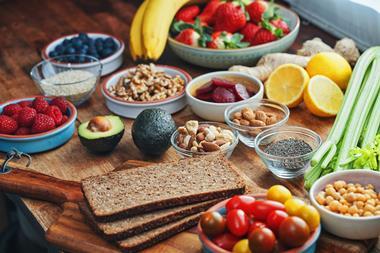Discover the key trends fuelling global growth, and how bakers can use them to give their business the edge.

Global macro forces, such as the lingering pandemic as well as new and rising social and economic tensions continue to cause individuals to evaluate and adjust their priorities. Consumers are rethinking what is truly important to them – what they value, what they choose to prioritise, and what they expect from others – in life and in their consumption choices. So how does this translate for the UK baked goods industry?
As companies shift to manage increasing expectations around health and wellbeing, sustainability and food security, they look to signals in the marketplace to determine the relevance and evolution of key consumer-driven trends.
While there are a number of opportunities to which companies should pay attention, ADM has identified five of the most important and relevant (for bakery) market growth drivers that point the way for innovation and renovation, now and into the future.
1. Experimental Eating
2. Balanced Wellness
3. Expanded Protein Choices
4. Trust & Traceability
5. Earth-Friendly Production
Higher-level macro forces shaping global consumer priorities and considerations
Before delving into the market growth drivers, it’s worth taking a look at the higher-level macro forces behind them.
Demographic changes
Consumer demographics are shifting. In certain pockets of the world, younger people comprise a larger and rapidly growing segment; yet in others, the population is aging. Globally, it is projected that, by 2050, people over 65 will outnumber those aged 15-24 for the first time.
A recent Mintel report1 indicated that the total UK population is forecast to increase by 1.2 million over 2021-6, which is good news for sales of cakes and sweet baked goods given that they are widely consumed across all age groups eat them. However, it is the younger population (under-45s) who are most important to the market. Overall, their numbers are forecast to stagnate over the next five years.
People are also on the move, with the share of global immigrants and refugees continuing to increase. This is leading to populations becoming increasingly diverse and multicultural – for example, the US is expected to become a majority-minority nation by 2045.
Urbanisation will continue to increase, with the majority of growth coming from Asia and Africa.
Shifting lifestyles
Certain aspects of life, such as where we work, what we do and what we value continue to morph. More women entering (and leaving) the workforce, the growth of a part-time and temporary contract labour market, automation and the pandemic are altering the structure of work along with consumers’ daily routines related to shopping, cooking and eating.
There are greater expectations to access food anytime and anywhere, and consumers are looking to flexible and convenient solutions that align with new lifestyles, as well as elevated snacks to provide more nutrition to get them through hectic days.
Economic pressures
Global events such as the pandemic, inflation, war and supply chain disruptions have impacted the economic realities of consumers’ daily lives. These events have continued to shift consumers’ purchasing habits to reflect social values as well as economic constraints.
Inflation is a worry for consumers. When surveyed in February 2022, 68%1 were worried about rising fuel costs, and almost as many were concerned about increases in food and drink prices.
Market growth drivers for 2023
1. Experimental Eating
Consumers desire new experiences and are finding adventure through food, discovering new flavours, textures and colours. They also find comfort and pleasure through playful brands or nostalgic and indulgent foods that have been upgraded to align with modern values around health, functionality and sustainability.
As noted in the latest British Baker Top Bakery Trends Report2, nostalgia has been a key trend for bakery in recent years. However, it is now time to take it to the next level by adding a modern twist to traditional favourites.
ADM has a pantry of foundational ingredients to serve as the basis for culinary inspiration, including flours, pre-mixes, flavours, colours, sweeteners, proteins, starches, texturants, fats and oils. For example, the ADM Crème Cake Mixes are designed with the busy baker in mind; from just one mix there are endless possibilities. Download the full recipe brochure here for recipes including luxury cupcake flavours, such as Gin and Elderflower, Eton Mess and Toffee Popcorn.

2. Balanced Wellness
Consumers’ approach to health and wellbeing is increasingly intentional and mindful – with the goal of achieving balance across all parts of life, from the physical to the spiritual. They are more aware of how body performance, energy, keeping healthy and just ‘feeling good and happy’ are attained through a synergistic approach to health and wellness – with an emphasis on eating well and a deep connection between physical and mental health.
While the sweet baked goods market will benefit from continuing consumer demand for sweet treats and the enduring popularity of cakes for celebrations. Mintel predicts1 that growth in sales will be held back by consumers focusing on health, alongside less visibility for these mostly HFSS products in retail outlets. And a quality over quantity mindset offers further growth potential for premium products.
The same Mintel report finds that being heathier is a low priority when people are choosing cakes. A healthier version only sways 23% of consumers when it comes to individual cakes1. The majority of those surveyed say that taste is still more important to them than healthiness when it comes to cakes, cake bars and sweet baked goods. Alongside this, finding that 91% of people claim to eat cakes, cake bars or sweet baked goods1 suggests that there is still very much a place for cakes as a treat, with most consumers preferring to eat a small amount of an indulgent cake than more of a healthier one.
3. Expanded Protein Choices
Conscious consumers are opting for a flexitarian approach to eating, putting choice at the centre of their search for a more resilient food system that aligns with their needs related to positive nutrition, sustainability, and exploration. Plant-based reflects ideals around a balanced approach to eating that also incorporates variety, while animal-based products that are precise and sourced from responsibly fed animals are increasingly seen as addressing food quality and nutrition while also increasing efficiency for farmers.
4. Trust & Traceability
To garner trust among consumers, it has become increasingly important that traceability efforts communicate not only what is in a product but where the ingredients were sourced, how the product was produced/processed, who made it and under what conditions. Driven by a demand for transparency and food safety, consumers desire a connection to the food they eat and the communities they support.
The ADM Integrated Sustainable Supply Chain partners with the finest growers of the best possible wheat. Members will engage with ADM to help drive quality, innovation and service, as well as delivering an overarching focus on improving the environmental way in which they grow their crops.

5. Earth-Friendly Production
Consumers are articulating heightened concerns about a range of environmental issues related to climate change, pollution, reliance on fossil fuels, resource use, packaging, plastics and agriculture. They are demanding innovative, technology and technique-driven solutions that go beyond merely minimising waste and resource use to restoring and rebuilding the environment, all of which are sustainable solutions they perceive as safer and healthier for themselves and the planet. Euromonitor recently reported that nearly 60% of people feel that they can make a difference to the world through their choices and actions3.
This is an area where ADM is paving the way with good business practices, progressive solutions and mindful actions that make a positive impact, such as the implementation of the ISO 50001:2011 energy management system throughout the company’s flour milling locations. This creates a culture of energy usage monitoring and saving, thus allowing ADM to track its progress in reducing greenhouse gas emissions and energy intensity. And the company’s 2021 pledge to purchase all of its electricity from 100% renewable sources will reduce its GHG emissions from milling operations to almost zero.
Learn more about ADM Milling UK’s pledge and how you can obtain your ESG goals in our previous article ‘Sustainability: the ‘must have’ ingredient’.
Your Edge. Our Expertise. Discover more at ADM.com/trends
*This communication is intended for B2B use and no statements are meant to be perceived as approved by regulatory authorities.
ADM Baking Solutions portfolio
Learn more about ADM’s extensive portfolio of wholesome nutrition ingredients plus complementary ingredients and key enablers to meet your needs for optimising taste, texture, nutrition, functionality and cost factors at www.4flour.co.uk and www.adm.com/youredge or email the ADM Milling Team @ sales4flour@adm.com and the ADM Nutrition Team @hello-nutrition@adm.com.
Sources:
ADM Global Consumer Trends 2023 - ADM.com/trends
1 Mintel - Cakes, Cake Bars and Sweet Baked Goods. UK, April 2022
2 British Baker, Top Bakery Trends Report: https://bakeryinfo.co.uk/finished-goods-reports/top-bakery-trends-2023-revealed/673574.article
3 Euromonitor Top 10 Global Consumer Trends 2022. – Euromonitor International Voice of the Consumer: Lifestyle Survey
*



































